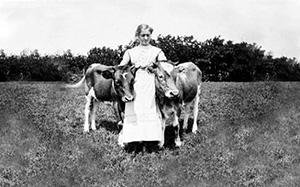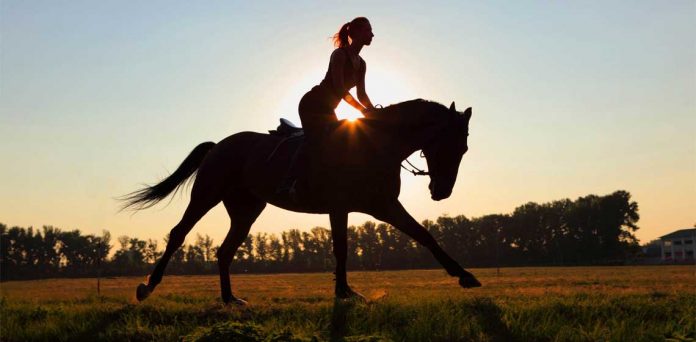The pioneers brought very little with them when they came to settle the wild frontier of North America. Many had basic knowledge or understanding of the careers they left behind. Many have had to learn new daily skills to survive the wilderness. Much of the precious knowledge is in danger of being lost.
Here are 12 pioneer skills we can’t afford to lose:
1. Bartering
The art of bartering is a skill which anyone can learn. It’s simply buying what you have with someone else, or what you can do for it. As a seamstress, you might trade your skills with your neighbor who is expert in plumbing. Swap your excess eggs off your neighbor’s cow for a gallon of milk and everyone is satisfied.
Related: The Advantage and Disadvantage of Bartering
2. Horseback Riding
Although it can sound like a luxury item; learning to ride a horse or mule is in fact an ability which can be useful in a situation of survival. Horses, mules, and oxen are all alternate means of transport, as well as burden-beasts. These may be used for pushing carts, plows, and wagons as well as long distance transportation.
3. Blacksmithing
Unlike other western perceptions, blacksmiths are doing a lot more than just putting shoes on horses. There are several blacksmithing-derived specialties. A horseshoer (known as a farrier) is one. Working with the anvil, forging, and iron is an ability that is used to make a number of different things. This includes wagon wheels, armor and weapons, blades, cooking utensils, farm implements, fencing, and just about anything else that needs metal manipulation. Because of this broad variety, the Blacksmiths were often an important part of any culture.
4. Leatherwork
Knowing how to deal with leather can be an acquired skill. From skinning and tanning the hides, down to making the final product, there are several layers to it. Being able to make straps, belts, harnesses, and reins, will help as well as generate income around the homestead.
5. Construction and Maintenance
It’s important to be able to construct shelter and other structures, particularly when you’re forced to start from scratch. On the same note, skills like plumbing, carpentry, and masonry will help you develop and maintain your property and buildings. There are also ways of having a barter or profit for items you like.
6. Animal Husbandry

One thing is keeping the livestock to feed your family. It’s another learning how to breed and develop your flocks and herds with the future in mind. Educate yourself on animal health and the desirable traits for your animals and their offspring.
This might include large carcasses, heavy milk or egg production, and hardiness. Weaker or lower quality animals are not ones you would want to breed and keep in the gene pool.
Related: Mini-Farming on 1 Acre
7. Butchering
Livestock raising and hunting or fishing are always suitable skills for your meal. But if you don’t know how to butch or handle the animal and store the meat, it won’t do a lot of good for you. To optimize your yield and generate little waste, find out which techniques and equipment are required to do it properly.
8. Gardening (for things other than food)
It’s an obvious and necessary skill to grow as much of your own food as possible. But did you know that you can also create your own medicine, clothing fiber materials and building supplies, and household goods ingredients such as coloring, soaps, and candles? Add a few hops and grapes to your greenhouse, and make your own beer and homebrews as well.
9. Foraging and Wildcrafting
Wildcrafting is the act of foraging food in or where it grows wild in its natural habitat. The secret to this ability is to know what food is edible, and where to find it. Many people are also going to “cultivate” and protect areas where they grow these foods themselves. Examples of popular wild foods are herbs, berries, and mushrooms.
Related: Foraging for Edible Wild Plants
10. Seed Harvesting and Saving
With any kind of farming or gardening effort, one thing is always needed to grow a plant – a seed. As they made the trek across the plains, settlers brought many saved seeds with them, some were even coming from Europe. During harvest, it keeps back certain quantities of seeds from each crop or type of garden plant. These seeds are dried carefully and put away to become the new crop for next year. Also, they can be traded with other growers to introduce new varieties to the garden or farm.
11. Navigation and Orientation
Knowing how to find your way around without using GPS, maps, and compasses is something that everyone should familiarize themselves with. Learn how to pay attention to your surroundings, the sun/moon/stars position and other geographical clues to find your way around.
12. Tracking & Trapping
The art of tracking is everything about observation, similar to navigation and orientation. Being able to see and understand animal signals-both two-legged and four-legged, can help provide food and ensure health. A skill that requires patience and practice is following trails in all types of terrain and changing weather conditions.
The difference between hunger and a full belly may be getting the skills to build easy snares and set up traps. s It can also help to ensure safety by employing more elaborate set-ups like net, pits, and trip-lines.
Some of these forgotten abilities go hand in hand, as you can see. We rely on each other to help you make sure your own family is safe and surviving. How will you apply our list of 13 creative skills we can’t afford to lose?











